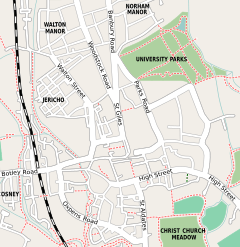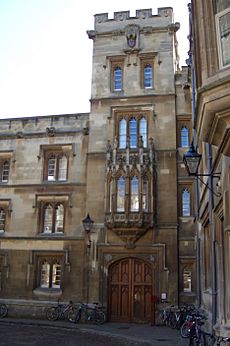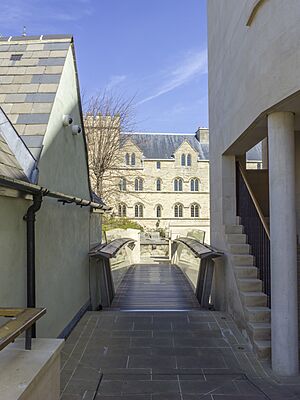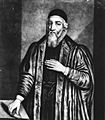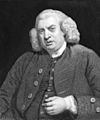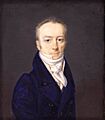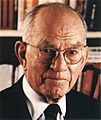Pembroke College, Oxford facts for kids
Quick facts for kids Pembroke College |
||||||||||||
|---|---|---|---|---|---|---|---|---|---|---|---|---|
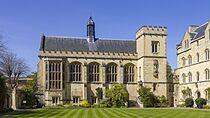 |
||||||||||||
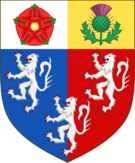
Blazon: see below
|
||||||||||||
|
|
||||||||||||
| University | University of Oxford | |||||||||||
| Location | Pembroke Square, Oxford OX1 1DW | |||||||||||
| Coordinates | 51°45′00″N 1°15′28″W / 51.750062°N 1.257827°W | |||||||||||
| Latin name | Collegium Pembrochianum | |||||||||||
| Established | 1624 | |||||||||||
| Named for | William Herbert, 3rd Earl of Pembroke | |||||||||||
| Sister college | Queens' College, Cambridge Grace Hopper College, Yale |
|||||||||||
| Master | Sir Ernest Ryder | |||||||||||
| Undergraduates | 365 (2015/2016) | |||||||||||
| Postgraduates | 227 | |||||||||||
| Boat club | Pembroke College Boat Club | |||||||||||
| Map | ||||||||||||
Pembroke College is a part of the famous University of Oxford. It is located in Oxford, England. The college was started in 1624 by King James I of England and VI of Scotland. It used money from a merchant named Thomas Tesdale. The college was named after William Herbert, 3rd Earl of Pembroke, who was an important person at the University.
Like many Oxford colleges, Pembroke used to be only for men. In 1979, it started accepting both male and female students. In 2020, Pembroke College had about £63 million in its special fund. Pembroke College offers almost all the subjects you can study at Oxford University.
Sir Ernest Ryder, a former important judge, has been the head of Pembroke College since 2020. He is called the "Master" of the college.
Contents
History of Pembroke College
How Pembroke College Began
In 1610, Thomas Tesdale left £5,000 in his will. This money was meant to help students from Abingdon School study at Balliol College, Oxford. However, in 1623, another person, Reverend Richard Wightwick, added more money.
They decided to use the money to turn an old building called Broadgates Hall into Pembroke College. Broadgates Hall used to be a place where law students lived and studied. King James I officially started the college in 1624. He named it after William Herbert, 3rd Earl of Pembroke.
Understanding the College's Coat of Arms
Pembroke College got its special coat of arms on February 14, 1625. A coat of arms is like a unique symbol for a family or institution. The college's coat of arms shows symbols for both King James I and the Earl of Pembroke.
The rose (for England) and the thistle (for Scotland) represent King James I. This shows how he united the crowns of England and Scotland. The three lions and colors come from the Pembroke family's own coat of arms.
Buildings of Pembroke College
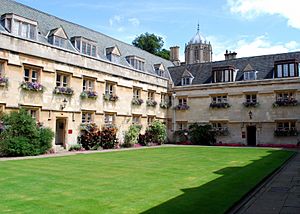
Exploring the Old Quad
After it was founded, Pembroke College started to grow. They built what is now called "Old Quad" in the 1600s. It was made from local Cotswold limestone. Because space was limited, the south side of the Quad was built right on top of the old City Wall.
Discovering Chapel Quad
A Chapel was built in 1732. More student rooms were added in 1846, and a dining hall in 1848. These buildings together created "Chapel Quad." The Chapel's inside was later changed by Charles Kempe, a former Pembroke student, in 1884.
Dr. Damon Wells, another Pembroke graduate, helped the college a lot. He paid for the Chapel to be fixed in 1972 and again in the 1990s. The Chapel is still used for church services today and is named after him.
Visiting North Quad
The college grew even more in the 1960s. This happened after a road called Beef Lane, north of Chapel Quad, was closed. The houses north of this road were bought by the college. This area is now called "North Quad" and was officially opened in 1962.
The Modern Rokos Quad
In April 2013, HRH The Duke of Kent opened a new area called "Rokos Quad." It is named after a main donor, Chris Rokos. The new buildings have a large hall for events, a cafe, an art gallery, and classrooms.
This new area is connected to the main college by a bridge over Brewer Street. This bridge crosses the old medieval city wall. With these new buildings, students can now live in college for all their years of study. Graduate students also have more rooms, and there are apartments for those with partners.
The Geoffrey Arthur Building (GAB)
There is a modern building called the Geoffrey Arthur Building, or "The GAB," located by the River Isis. It provides homes for about 115 graduate students and 40 undergraduate students. The building is named after Sir Geoffrey Arthur, who was the Master of the College from 1975 to 1985.
Student Life at Pembroke
Junior and Middle Common Rooms
Pembroke College has a Junior Common Room (JCR) for undergraduate students. This JCR is known for its art collection and sports success. It is one of the richest JCRs in Oxford. This is because it bought a painting by Francis Bacon for £150 in 1953 and sold it for £400,000 in 1997. The JCR uses this money to help students and buy more art.
Sports Achievements
In 2018, Pembroke College made history in rugby. It was the first college to win two rugby awards in one year. The women's team won "Cuppers," and the men's team won the "Cuppers Bowl."
The Pembroke College Boat Club is also very successful. In 2013, both the men's and women's first boats did very well in rowing races. In 2018, the Pembroke Women's first boat won the "Summer Eights" headship. Pembroke has often been the top club for total points across all its boats.
People Associated with Pembroke College
Famous People from Pembroke
-
Samuel Johnson, a famous writer and dictionary maker
-
James Smithson, who started the Smithsonian Institution in the USA
-
Sir William Blackstone, a famous English law expert
-
Sir Roger Bannister, the first person to run a mile in under four minutes
-
Michael Heseltine, a former important British politician
-
Viktor Orbán, the Prime Minister of Hungary
-
Hilarion Alfayev, a leader in the Russian Orthodox Church
-
George Whitfield, an important preacher in the 1700s
-
J. William Fulbright, who started the Fulbright Scholarships
-
Walter Isaacson, a well-known writer and biographer
-
Richard Lugar, a former US Senator
-
Pete Buttigieg, a US Secretary of Transportation
-
Paul Gérin-Lajoie, a Canadian lawyer and politician
-
J. R. R. Tolkien, the author of The Lord of the Rings
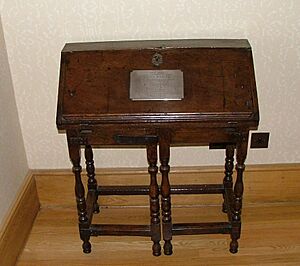
Samuel Johnson is one of the college's most famous former students. He had to leave Oxford early because he ran out of money. He always spoke fondly of Pembroke, saying it was "a nest of singing birds" because of its many poets. Two of his desks are still at the college.
James Smithson, who started the famous Smithsonian Institution in Washington, D.C., also studied at Pembroke. He changed his name to James Smithson after his mother died. Senator J. William Fulbright, who created the Fulbright Program for scholarships, was also a student at Pembroke in the 1920s.
More recently, Danielle Ivory, a journalist, Pete Buttigieg, a US politician, and Jonathan Fennell, a historian, have studied at Pembroke.
Diplomats from Pembroke
Thomas Randolph, who was in charge of Broadgates (Pembroke's earlier building), was an ambassador for Elizabeth I to Scotland. He was even friends with Mary, Queen of Scots. Later, he went to Moscow to get trading rights from Ivan IV, also known as Ivan the Terrible.
More recently, John, Baron Kerr of Kinlochard, was the British Ambassador to the United States. Philip Lader was the US Ambassador to the UK. So, in 1997, both the US Ambassador in London and the UK Ambassador in Washington had studied at Pembroke. Peter, Baron Ricketts was also a British Ambassador to France.
Two former chairmen of the US Senate Foreign Relations Committee, Senator Richard Lugar and Senator J. William Fulbright, also studied at Pembroke. They led this important committee for 27 years.
From Europe, the Prime Minister of Hungary, Viktor Orbán, and the Polish Foreign Minister Radek Sikorski studied at Pembroke. The Sultan Haitham bin Tariq of Oman and King Abdullah II of Jordan also attended Pembroke.
College Fellows
J. R. R. Tolkien was a Fellow (a senior academic) at Pembroke from 1925 to 1945. He wrote The Hobbit and the first two books of The Lord of the Rings while he was there. Since 2013, the college has held an annual lecture about fantasy literature to honor him. Robin G. Collingwood, a historian and philosopher, was also a Fellow at the college.
College Masters
Some recent Masters of Pembroke College include Sir Geoffrey Arthur, who led an important intelligence committee. Another was Sir Roger Bannister, who was the first person to run a mile in under four minutes. Sir Ernest Ryder, a former judge, became the Master of Pembroke College on July 1, 2020.
See also
 In Spanish: Pembroke College (Oxford) para niños
In Spanish: Pembroke College (Oxford) para niños
 | Leon Lynch |
 | Milton P. Webster |
 | Ferdinand Smith |


